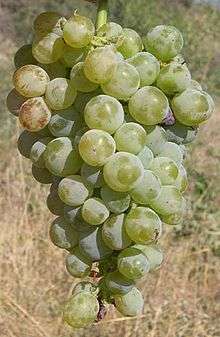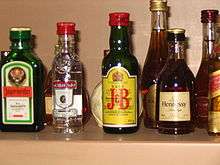Zivania
Zivania or zivana (Greek: ζιβανία, ζιβάνα)[1] is a Cypriot pomace brandy produced from a mixture of grape pomace and local dry wines made from Xynisteri and Mavro grapes.[2]Zivania stills are similar to those used for tsikoudia in Crete. Zivania is colorless and alcoholic with a light aroma of raisins. Its alcohol content varies, with 45% by volume being the typical value. Zivania contains no sugars and has no acidity.
History
Zivania has been produced in Cyprus since the time the Republic of Venice ruled the island, around the end of the 15th century. Evidence of its continued production during Ottoman and British rule of the island comes from writers such as the British writer Samuel Baker who in 1879 reports: "...the refuse of skins and stalks is laid upon one side to ferment for the manufacture of raki, or spirit, by distillation...".[3] Since 1989, zivania has been protected under EU regulations as a name for grape marc produced in Cyprus.[4]
Production
In order to produce zivania of the highest grade, mature healthy grapes of the best quality are used. The grape must used for the fermentation should be of less than 13° Baumé, in order to get complete fermentation. As soon as the fermentation process completes (i.e. producing less or equal to 0° Baumé reading), the wine and pomace mixture is transferred to the main container of the distillation apparatus, called kazani (Greek: καζάνι) and distillation begins. The first zivania that comes from the still has the highest alcohol content, while the last taken out of the apparatus has a low alcohol content and it is called porakos (Greek: πόρακος). Depending on the pre-distillation mixture, different qualities of zivania are produced:
- Zivania produced by using only wine the distillation
- Zivania produced by using wine and pomace for the distillation
- Zivania produced by using pomace, water and weak zivania
Storage and transportation
Zivania is usually stored in clean wooden or galvanised metal containers that can be sealed in order to contain evaporation. During transportation, care is taken not to damage the containers or allowing leakage or evaporation.
Usage
In addition to its use as a beverage, in Cyprus, zivania is used to treat wounds, for massaging sore body parts, as a remedy for colds and toothaches, or as a warming-up drink during the cold months of winter, especially in the villages of the Troodos mountains.
In old times, the main alcoholic drinks Cypriots consumed were wine and zivania. In some villages of Cyprus, cinnamon was added to zivania giving it a nice red color and a fine aroma and flavor. As zivania ages it gains a stronger flavor and aroma. Aged zivania has been valued very highly and is kept for consumption during special occasions or as a welcoming treat for visitors. Even nowadays at some villages in Cyprus, locals will welcome visitors with zivania served with dried nuts, Turkish delight, soutzoukos or small appetizers like Cypriot loukaniko, lountza and tsamarella.
Authenticity
To establish the authenticity of zivania, chemical studies were contacted to investigate which of the metals analyzed constitute diagnostic parameters that establish authenticity. The results of the studies establish that zivania is related to the unique geological and climatic conditions existing on the island of Cyprus.[5][6]
Consumption
Zivania is served ice-cold with the local meze, soutzoukos or dried fruit and nuts.
Photos
-

A bottle of Cypriot Zivania.
-

Xynisteri grapes used in the production of zivania.
-

Mavro grapes used in the production of zivania.
-

Distillation apparatus (kazani) found in the village of Amiras, Crete.
See also
- Pomace brandy
- Tsipouro
- Tsikoudia
- Rakia
- Pisco
- Grappa
- Aguardiente
- Törkölypálinka
- Chacha (brandy)
- Orujo
References
- ↑ "Ζιβανία ή ζιβάνα". foodmuseum.cs.ucy.ac.cy (in Greek). Cyprus Food Virtual Museum. Retrieved 26 November 2015.
- ↑ "Xynisteri". vounipanayiawinery.com. Vouni Panaya Winery. Retrieved 24 November 2015.
- ↑ Samuel W. Baker (1879). Cyprus, as I Saw it in 1879. Project Gutenberg (Etext edition, 2003). p. 120. ISBN 1-84637-912-1.
- ↑ " The name ‘grape marc’ or ‘grape marc spirit’ may be replaced by the designation Zivania solely for the spirit drink produced in Cyprus." "Archived copy". Archived from the original on November 15, 2011. Retrieved November 12, 2011.
- ↑ Authenticity of the Traditional Cypriot Spirit "Zivania" on the Basis of H NMR Spectroscopy Diagnostic Parameters and Statistical Analysis
- ↑ Authenticity of the traditional Cypriot spirit zivania


